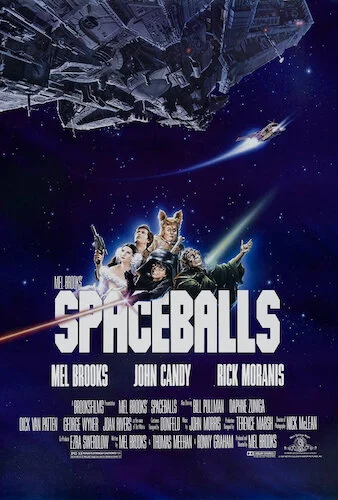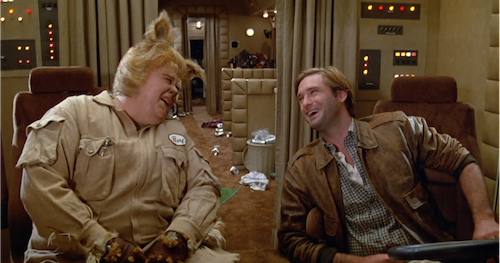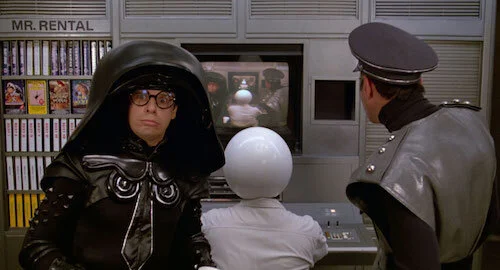Spaceballs: On-This-Day Thursday
Every Thursday, an older film released on this opening weekend years ago will be reviewed. They can be classics, or simply popular films that happened to be released to the world on the same date.
For June 24th, we are going to have a look at Spaceballs.
Okay, so we all know this isn’t really the best Mel Brooks film, but you can’t exactly make Young Frankenstein, The Producers, and Blazing Saddles again and again. A highly unfair criticism, which only ages worse with time, is that Spaceballs came too late after the Star Wars obsession of the ‘80s died down. I say this is unfair for two reasons. One, the fad was still going strong even if the films weren’t (Return of the Jedi was released in 1983, so four years off isn’t great but it’s hardly the worst length of time one waited to parody a trend). Two… well… I hardly need to explain it. Star Wars continues to be huge. In fact, it’s evident it never went away. With sequels and prequels still being made, and multi media expansions that never stopped, Star Wars was never not relevant.
So, that argument — to me — hardly stands strongly anymore. Spaceballs still satirizes the franchise quite well. It’s also jabbing science fiction and the filmmaking experience as a whole (lest we forget the stunt doubles moment). Again, I personally find that Brooks has done better work, but it feels so difficult to not find any bit of this film funny. If anything, it has become entrenched in current pop culture, to the point that it is still quotable and understandable (maybe with millennials anyway). Ludicrous speed? We’re looking at now? Raspberry? With the amount of jokes that continue to be pelted towards audiences, there has to be at least a few puns or gags that land, even if you don’t care for Star Wars.
Lone Starr and Barf.
The one thing that may make Spaceballs easier for critics to bash is that Spaceballs isn’t really saying a hell of a lot about the Star Wars experience, outside of the marketability of the franchise, and how it plays a capitalist game. You can’t say it attacks genre conventions as much as Blazing Saddles does, or dive quite deeply into mocking lore like Young Frankenstein, or even satirizing the business side of entertainment like The Producers. It does try to do all of these things, though, and it may dilute what is being said, but it doesn’t make it any less funny. Is it misguided as a commentary? Partially. Is it a malfunctioning conveyor belt of laughs? Hardly.
All of this also invites Spaceballs to be watched without turning your mind on at all, really. Blazing Saddles is a riot, but guaranteed you will take away something substantial from it. Spaceballs is straight up buffoonery, and that isn’t always a problem. Considering how the film still treats its audience well (lame jokes are only fodder for great punchlines, and everything else ranges from solid to side bursting hilarious), it’s quite strange how it can require zero energy or preparation, and yet not be completely brainless itself. This is thanks to the semblance of a story (of course, one that prods the original Star Wars saga entirely). I’m not suggesting you’re going to be emotionally invested in what happens to Lone Starr, but the focus on such a story is still thoughtful.
Dark Helmet in the “now”.
Spaceballs has it all: puns, slapstick, fourth walls being broken, and non sequiturs galore. Despite marking the start of the considerable drop in the Mel Brooks filmography, I believe Spaceballs still holds up at least just as the film you put on with some friends and just have fun with. Maybe people got complacent and expected everything Mel Brooks did to be poignant comedic gold. Perhaps critics back then hoped the end of the Star Wars trilogy meant the end of an era. Honestly, the initial backlash seems more like critics were tired, rather than the film being necessarily mediocre or bad. Then again, our culture is obsessed with references spouting from all sides. Maybe it’s just a generational situation. Spaceballs could be the rare misfire parody that aged well like a fine wine (or maybe it just held up okay like a Pepsi bottle left in the car during the winter). Either way, I can’t claim Spaceballs is the greatest film ever made, but I can’t deny that I laugh myself to tears watching it either.
Andreas Babiolakis has a Masters degree in Film and Photography Preservation and Collections Management from Ryerson University, as well as a Bachelors degree in Cinema Studies from York University. His favourite times of year are the Criterion Collection flash sales and the annual Toronto International Film Festival.







